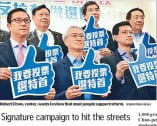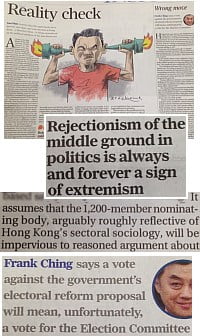Robert Chow’s pro-Beijing Alliance for Peace and Democracy is to mount another  laborious joke-signature campaign in support of Hong Kong’s proposed political reform package. The fact that the Chinese government’s local officials think such an exercise will convince the public is proof of how amazingly out of touch they are – or of how few tools they have in their kit beyond lame United Front stunts. With shoe-shiner clowns like these undermining whatever integrity it might have, the reform package needs some serious help.
laborious joke-signature campaign in support of Hong Kong’s proposed political reform package. The fact that the Chinese government’s local officials think such an exercise will convince the public is proof of how amazingly out of touch they are – or of how few tools they have in their kit beyond lame United Front stunts. With shoe-shiner clowns like these undermining whatever integrity it might have, the reform package needs some serious help.
The South China Morning Post does its bit by devoting two articles side-by-side on its op-ed page to the cause. The first is by Tom Plate.
Vaguely recalling the name, we look at the bottom and find he is updating his book Conversations with Lee Kuan Yew in the ‘Giants of Asia’ series. This isn’t looking good.
In essence, Plate blasts the pro-democrats for rejecting the Chinese Communist Party’s policy, which is the ‘middle ground’ – so the pro-dems are extremists. If you can accept that it’s the CCP who are the moderates here, it all makes sense. Even more questionably, he describes the 1,200 strong rubber-stamp Election/Nomination  Committee as “…arguably roughly reflective of Hong Kong’s sectoral sociology.” Which you may consider to be arguably roughly reflective of BS thinking; I couldn’t possibly comment.
Committee as “…arguably roughly reflective of Hong Kong’s sectoral sociology.” Which you may consider to be arguably roughly reflective of BS thinking; I couldn’t possibly comment.
To be convincing, a pro-package argument needs to dispense with the BS and look at the reality: China is a Communist one-party state in which the central core of power must control everything from the top down, no exceptions. If we have the imagination (helped by a little depravity) to step into Beijing’s shoes, it is possible to see this rigged quasi-democracy as a significant and scary step. First, even leaving the choice of three screened and hand-picked stooges to an unpredictable and partly hostile electorate is alien to the Leninist mind accustomed to leaving absolutely nothing to chance. Second, Beijing must be nervous about how allowing such a system in Hong Kong would strike the other 99.9% of their subjects on the Mainland, who already see the ex-colony as spoilt enough.
In order to complete a convincing pro-package argument, we then have to establish that the limited and managed competition between three Beijing-picked candidates will translate into a real race. In other words, candidates really will vie for votes by promising a more people-first approach than offered by the previous pro-tycoon/bureaucrat administrations. To be totally convincing, there needs to be some confirmation that Beijing accepts a need for such a shift in the style of local governance. (Apart from some vague hints, government officials seem reluctant to push this argument – yet if the reforms are not likely to improve governance, what’s the point? This argument could be turned on its head and used against the package by the pro-dems, but of course isn’t.)
If you want to just assault the pro-dems and damage their reputation as an end in itself (say to get Conversations with Xi Jinping rolling) there’s a simpler way. Just accuse the pro-dems of opposing the package, not because any candidate they nominate would be screened out, but because they don’t even have a candidate worth nominating. It’s not a totally fair allegation, but the mud would stick.
Across the page, Frank Ching claims that a vote against the package equals a vote in favour of the Election Committee. This appeals to pro-dems’ fondness for endlessly obsessing over the structure and symbolism of the electoral process. Of course, a vote for the package is also a vote in favour of the Election Committee – just relabeled ‘Nomination Committee’. Among other discussion about the thresholds and other technicalities, Frank repeats the stuff about the future potential for opening up the Committee to make it more broadly representative. This sort of thing is a diversion and invites yacking about cutting the number of fisheries’ seats and giving ‘youth’ some seats and similar rubbish. Bottom line: the Committee is a CCP rubber-stamp and will be so long as the CCP rules.
Frank’s column implicitly raises a good question: what is a vote against the package actually for? I’m not sure the pro-dems have a resounding answer to that.
So there we have it: Robert Chow and his goons collecting 20 million signatures; the SCMP offering unpersuasive arguments from Tom Plate and Frank Ching; and the opinion polls haven’t budged an inch.


Perhaps we could have a whip-round to add another few dollars to James Tien’s 250K, and have Robert Chung do a ‘referendum’ instead of a ‘survey’. Just need to get all the those bleating on about respecting public opinion to agree to respect the result…
Today’s SCMP is really going for 11 on the BS-ometere. Check out the backpage of the business post where Richard Wong (‘scuse: Professor Richard Wong) proves with a graph that some democracy is good but too much is bad. I’ve seen some graphical shenanigans before but this is utter twaddle. I defy anyone to see a pattern in that graph. A prime example of how low some academics will stoop.
Would we actually need a pre-screened election to reduce the influence of the tycoons? It’d just as likely open up new opportunities for the tycoons to get involved in DAB Granny-bribing and campaign finance shenanigans. If Beijing wanted more people-first governance here, they would get further by ordering the tycoons to suck it up and deal or else their business ventures will be strangled in red tape up north.
Up North, the people are subservient to the Govt and so must it be here too in time. We can’t get above ourselves. We exist to serve them, not vice-versa. Ironically, its all very feudal for a nominally marxist system. Unsurprisingly the local officials are rather starting to enjoy participating in this mindset. What always surprises me is how many they can find to chant “we’re too dumb to choose for ourselves, we prefer others to choose for us” as cheerleaders for whatever govt perversion of democracy they choose to peddle. Must be the mind blowing fear of having to make decisions for yourself drives the Robert Chows of the world into their arms. Maybe the school curiculum should be changed with liberal studies being replaced with feudal studies and we can all learn of the divine (?) right of officialdom.
Considering the public response to Robert Chow’s last signature campaign, I imagine every Latin American footballer will sign this one at least 18 times each. Very enthusiastic bunch, those footballers.
Boris Badanov hits the nail. Princlings (ala Italian City-States) is a key word to discribe how the party has carved up China.
The protests up the coast in Ma Gang (Shanwei) that much in the Western Press ruminated were distant rumblings for democracy. Hardly, polling was suppose to be the manufactured seal on the final results between series of knife fights between the local versions of the Guelphs and Ghibellines kicked off by the death of the local peacemaker. The loosing side decided not to go down gracefully, but in the end, down they went.
Your graphic artist is great, a real genius—Tung Chee-hwa & all the other Scissorshands creeps tearing Hong Kong’s freedoms to shreds!
Mao led the CCP to power by fomenting a mass revolt of the peasant class against the landlord class. Now the CCP are the landlord class. Do Hong Kong and China need a 21st century Mao? If not now, then in the near future? Pretty ironic just to be asking the question.
http://hacktext.com/seo201/lib/imgs/darth-vader-force-choke.jpg
or considering the warm and fuzzy nature of the opposition.
https://tctechcrunch2011.files.wordpress.com/2010/05/vader.jpg